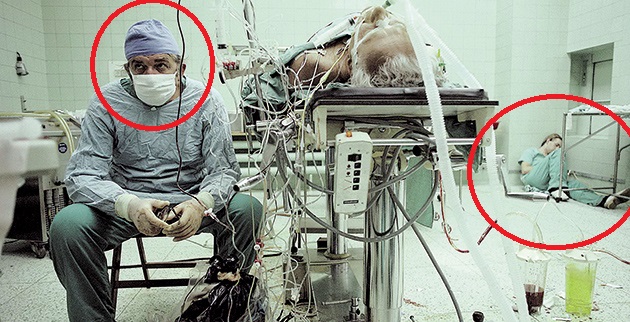IOM Jobs: In-House Or With A Contractual Neuromonitoring Company: Pros And Cons
With the amount of people looking to get into neuromonitoring, and some of the larger companies slowing down their hiring till the dust settles on these billing issues, it seems like most people would “take what they can get.” And I’ve shown those people how to search out a neuromonitoring company or hospital department to get their foot in the door.
But it may not be the same story for those fortunate enough to have experience in the field, and studied hard enough to get their CNIM and/or DABNM. I see people on Linked in changing companies all the time, as well as recruiters looking for new hires. So there is plenty of activity for those looking for an IOM job opportunity. [UPDATE: Since I wrote this in 2013, I’ve moved on to my second company. If you know me, then you know that is not typical of my personality. But I’ve been fortunate enough that opportunities presented themselves.)
I’ve had the good fortune to work for both a contractual company and in-house neuromonitoring department. While my experience is limited to these places, I’d thought I’d share some of the pros and cons of each.
IOM Contractual Company vs In-House
Let’s start with the 3 most important factors…
“How many hours am I going to work, how much am I going to be traveling and how much am I going to make?”
The Hours
My experience with the contractual group had me leaving my house at 5:00 am one morning, and 2:00 pm the next. On days I wasn’t scheduled, I still couldn’t leave my phone or my equipment. So although I was technically not working, I was really limited as to what I could do. I had to be always ready to go when they needed me.
At the in-house job, I start at 6:30 am Mon-Fri. I rotate emergency call, which means I’ll be here till 3:00 pm at the earliest, but usually till 5-7pm on my call days. On the days I’m not taking that call, I’m out of here at 3 pm.
So overall, the in-house is more hours, but at least I can plan for things on my non-call days. It makes a difference to have some days where you know you won’t be working. But then again, being able to sleep in once in a while was nice too.
The Travel
If you’re with a contractual neuromonitoring company, get ready to drive and/or fly. And if you’ve got a gas guzzler for a car, it’s time to rethink your ride. The government says you can factor in about $0.56 per mile on average. That number drops down to about $0.41-$0.45 if you’ve got a prius, scion tA, honda fit, etc. But that jumps up into the $0.60’s when you start moving into the trucks and SUV’s.
When you talk to the other people that are working for that company in that territory, ask them how much they drive a week or month. Say you average 20 miles a day at the local hospital, and 40 miles for the contractual company. That’s another $10/day in cost to you (really about $12 after you factor in after-tax dollars).
But I seemed to work fewer days at the contractual company. Sure, those days I worked were all over the place, and sometimes long hours, but at least my car was parked. So if I worked 4 days a week on average, that’s less than what I work at the in-house (guaranteed mon-fri, occasional weekend).
In-house = $3080 (5.5 days/wk for 50 weeks, 20 miles per day, $0.56/mile)
Contractual = $4,480 (4 days/wk for 50 weeks, 40 miles per day, $0.56/mile)
Cost = $1,400 more with contractual company (really $1,680 after tax cost). .
HOWEVER: Most contractual companies will have some traveling expenses they will cover. That can significantly eat into that difference. As a matter of fact, you might end up with more money covering cost from the contractual company. It all depends on those variables of distance, cost of gas, type of car you drive, regular commute distance, etc.

choose your car wisely if working for a contractual neuromonitoring company
The Pay
Speaking of salary, the general consensus seems to be that you earn more working for a contractual group. While that’s on a case-by-case, I’d agree that overall, that might have some truth to it. But you’ll need to find out for yourself, because who cares what the trends say if you’re getting different offers.
All the other perks, like 401K, health insurance, etc are pretty similar. Maybe not so with a smaller contractual company.
[socialpoll id=”2365687″]
The Day-To-Day
With an in-house group, it REALLY helps if you like the people you’re working with. There’s down time where you’re sitting around with these people. It’s hard to escape. With a contractual group, you can pretty much stay away from most people if you want. I only saw some people once a year at the holiday party (all good people and friends of mine, that’s just how it was).
Working at an in-house neuromonitoring group means you’re on staff at the hospital, so other people in the room see you as “one of them.” It’s been a lot easier getting scheduling to keep you updated, TIVA from anesthesia and keeping psycho nurses at bay if you’re not wearing that red cap that screams “keep an eye on this dirtbag, s/he’s here to sell you stuff.” And forget those morning visits to biomed, where you sit around waiting for a green sticker while your patient is getting wheeled into the room. You know everyone, they know you, and things are just more routine.
Did I mention you know everyone and they know you? Well, that’s not always a good thing either. You’ll be right smack in the middle of all the hospital gossip and drama. It’s near impossible to avoid.
The Responsibility
Speaking of less communication, that also means that you’re more “on your own.” That’s both good and bad. You have more freedom to “call the shots” and make decisions in your case without someone breathing down your neck, but you better make sure you’re doing the right thing. With fewer checks and balances, it’s way less annoying, but probably easier to mess things up or pick up bad habits (although my guess is that this is getting to be less and less with the amount of remote monitoring that’s going on these days). [UPDATE: If you didn’t know, I started with a group that hires mostly doctors that interpreted thier own cases. The field has shifted away from that model, and those companies are becoming less and less common. Now, you’ll have oversight on all your cases even if you are working in a contractual neuromontoring company. This is because insurance pays that way, hospitals demand it and companies want to cover their butts.]
The Exit
When that time comes to move on to your next place of employment, it’s a real PITA leaving a contractual company. Lawyers, or at least the threat of getting them involved, seem to be the norm. Must require an extended notice to terminate your contract, can’t work in this large geographic area for long periods of time, etc. Just starting with a contractual company usually doesn’t offer the best exit strategy, so in-house might be a better choice for that person looking for more of a “non-permanent” gig.
The Conclusion
I really don’t know which I liked better. That’s not the final answer you probably want to hear, but that’s all I got for you.
How about you? Is there one you would never go back to doing?




In House vs Travel, This is very well thought out. I have to add a few issues that can really make that contract company a nightmare & I have experienced many of these issues myself both as a well intending manager AND as the average, hard working tech.
There are more contract companies than not that seem to hire tech’s with a lot of sunshine type promises which include, we only use our tech’s within their geographical location and the working lifestyle is great. Some may even start out with the very nice 3-4 day work week @ 40-50 hrs. BUT, if there are corporate profit issues, or the business grows or tech’s leave, then extra hours, extra travel, extra stress become the norm. Asking a tech to work 12+ hrs AND then travel to the next location begins to happen. The accounts notice increased coverage reliability issues AND the reputation of the poor tech’s suffer. Because the possibilty of missing cases now affects the professional relationship, the hospital can even possibly FIRE the IONM company! AND, as your point about non-compete agreements states, now it’s very tough to find another job in town! What a nightmare!!!
Also, Going to work for any size company which is establishing itself into a new market is a treacherous endeavor!!! There is some probability that a final contract has not been completed with that hospital! IF final terms cannot be agreed upon, going to work for that company can leave you out of work completely if the contract is then awarded to the competition! Very Similar situations regularly occure when a company is bought out. The hospital most times has to carry over the contract BUT, the reputation of the new company can be so poor that the contract may not be renewed AND the tech again is left hanging out in the wind, without a job!
SO, I would give the advice to those considering the contract company route to assess that company’s staffing levels & how often tech’s travel into AND out of the geographical region. Ask IF travel pay (More than just the $0.56 / mile) & overtime are provided? IF those issues FEEL wrong to you in your gut, then consider very strongly into looking at another company.
@Greg Keeton and @J. Renteria, thanks for your input. Should help some others in making their decisions.
I’m having this problem right now. Left a contractual company and now they’re harassing me with a lawsuit. Fortunately, I’m in Texas (a right to work state). Not breaking the contract by simply not working with the same surgeons I worked with before.
nice piece